Rosario Murillo and Daniel Ortega, vice president and president of Nicaragua, at an event in Managua last December. AFP
The storm unleashed by the deliberate absence of Colombia in an OAS session on the condemnation of the Nicaraguan regime, for persecuting the press and imprisoning opponents, does not subside.
The foreign policy of the Government of Gustavo Petro stumbled then, just after the left-wing president took office, with its first stone, in a move that has caused, among others, the opposition to promote a motion of censure against the chancellor, Álvaro Leyva.
In addition, this risky bet has run into an apparent rejection of the Daniel Ortega regime.
The move of Colombian diplomacy, never fully clarified, has not borne fruit, judging by the message of an Ortega spokesman.
"We are not asking for anything other than that they recognize the ruling of the highest court on the planet," said William Grisby, Ortega's unofficial spokesman, on his radio program on Monday about the dispute between Colombia and Nicaragua in the International Court of Justice of the Is.
His words have been interpreted as a slam of the door to the steps of the Petro Government with respect to the alleged negotiation to obtain the release of a group of political prisoners, on the one hand, and the possibility that the fishermen of the Caribbean island of San Andrés can work in waters that the court has declared as Nicaraguan.
Without identifying the messengers, Grisby — whom the Nicaraguan newspaper
El Confidencial
describes as "one of the main propagandists of the Ortega-Murillo regime" — assured that the negotiation proposed by Colombia implied recognizing the Hague ruling in exchange for the release of political prisoners.
The journalist Daniel Coronell had already pointed out, both in his column for
Los Danieles
and on W RADIO, that Bogotá is trying to negotiate with Managua the application of the sentence, issued last April, so that it allows the Raizal fishermen of San Andrés to continue working in those waters that The Hague granted to Nicaragua since 2012.
Coronell agrees that the second reason for Colombia's absence from the OAS session was the effort to free a group of at least 14 political prisoners, including former presidential candidates Juan Sebastián Chamorro, Medardo Mairena, Miguel Mora Barberena and Felix Madariaga.
"Cuba also participates in this intermediation," adds the journalist.
In the only official communication before the rain of criticism, a statement signed by Leyva that arrived after days of controversy and speculation, the Foreign Ministry assured without further details that the absence of Colombia in the session on August 12 was for strategic reasons and humanitarian, but not ideological.
She then spoke of the "window of opportunity for a major humanitarian action in Nicaragua," which coincided with the vote that day at the OAS.
"Diplomatic silence was kept because we could not make public the international negotiations that were being carried out before obtaining a result," she shielded herself.
The right has not missed the opportunity to accuse Petro of promoting an ideological foreign policy, in line with the authoritarian left in Latin America.
Since then, the Democratic Center, declared in opposition to the Executive, has announced that it will promote debates against the Minister of Foreign Affairs both in the Senate and in the House of Representatives.
In both cases, the government is heading for large majorities that should prevent an unlikely censorship.
Petro, who took office on August 7, seeks to mark the path of the new Latin American left, but the regional leadership to which he aspires is also played out in his positions with respect to the old left.
In campaign he marked distance with respect to authoritarian regimes such as those of Cuba, Venezuela and Nicaragua.
However, both Havana and Caracas are key to the total peace that the government is pursuing, which requires a negotiation with the ELN guerrillas.
In these two cases, a welcome normalization is advancing after years of diplomatic tensions in the period of Iván Duque.
It is in Managua where, for now, the new Colombian diplomacy has bogged down the most.
Subscribe here
to the EL PAÍS newsletter on Colombia and receive all the key information on the country's current affairs.

